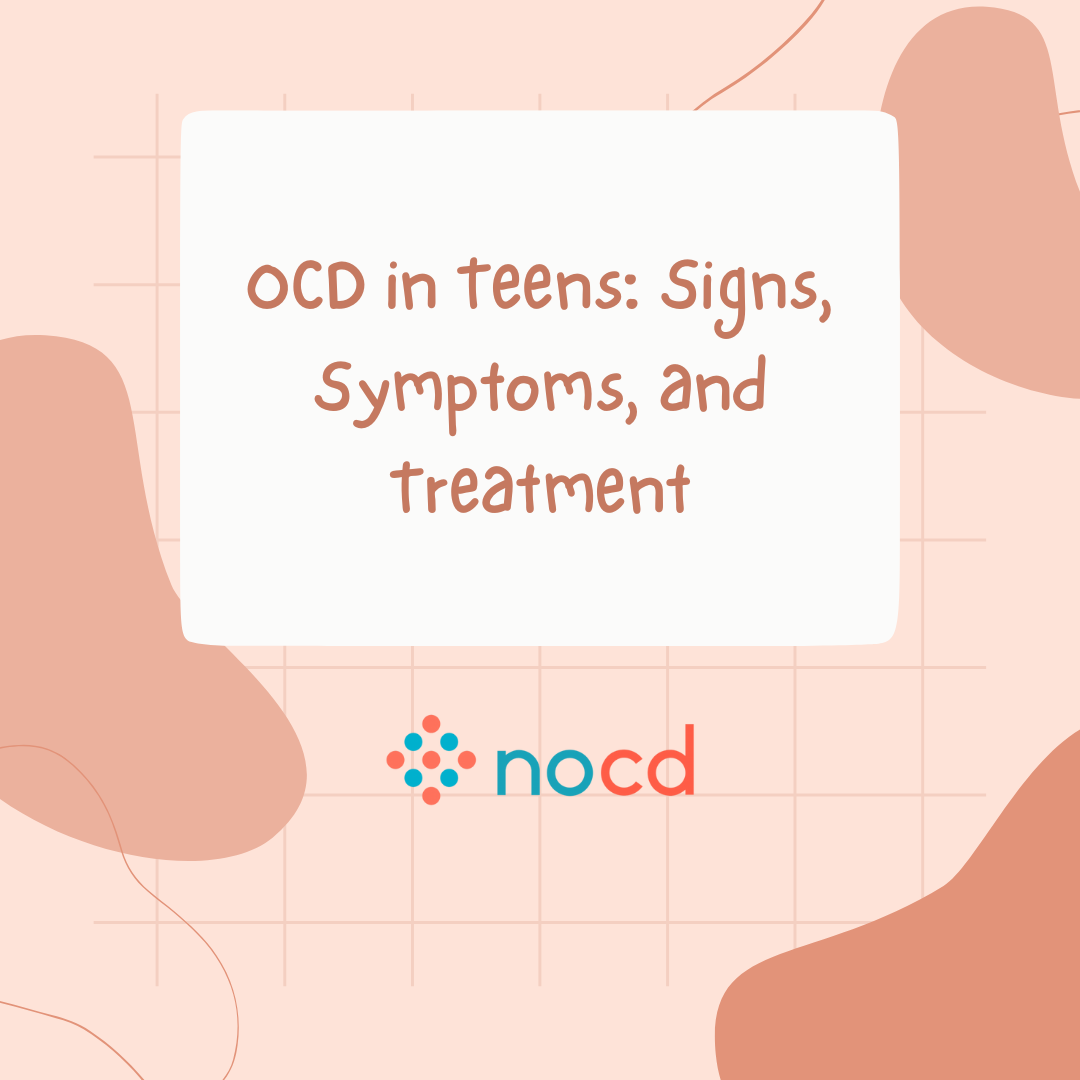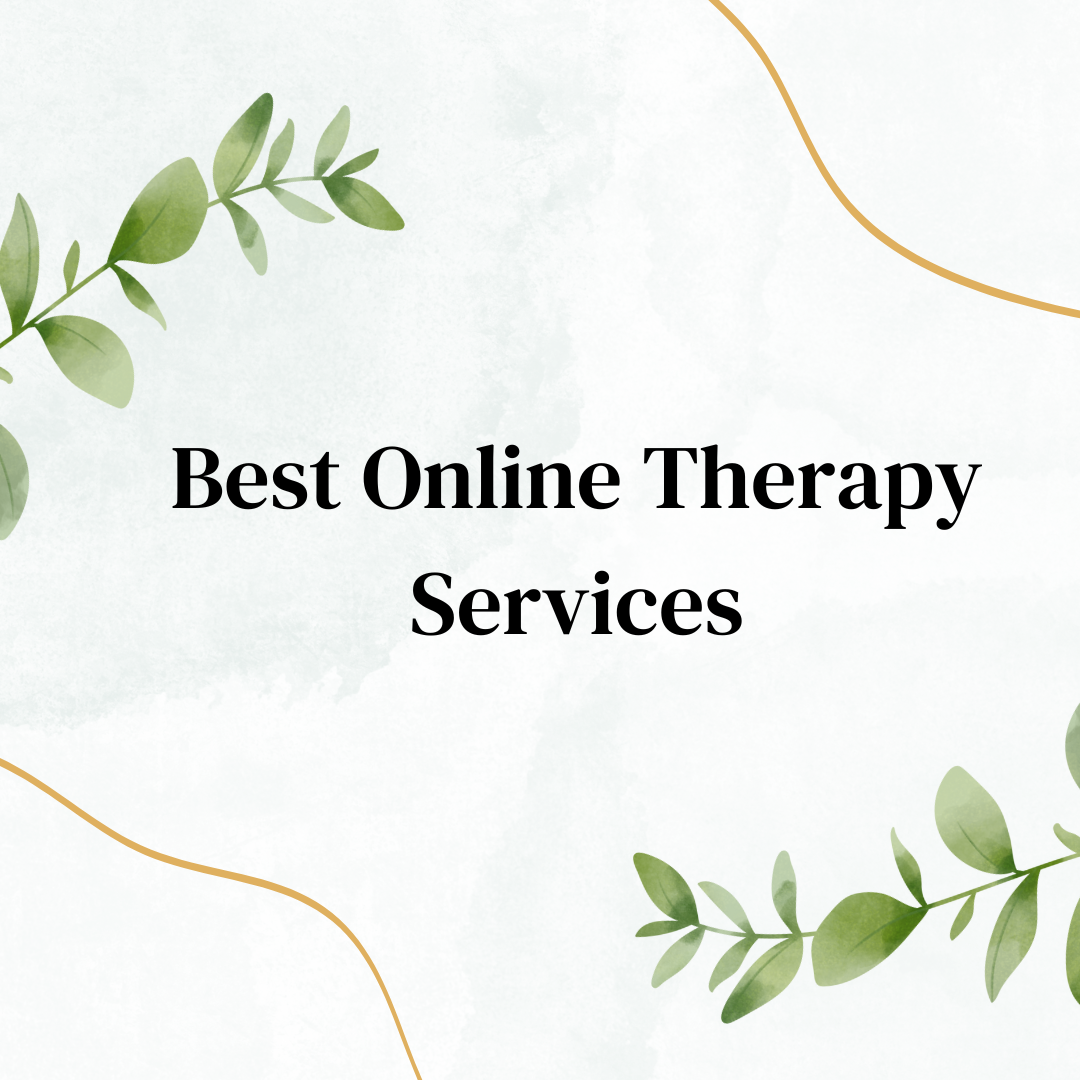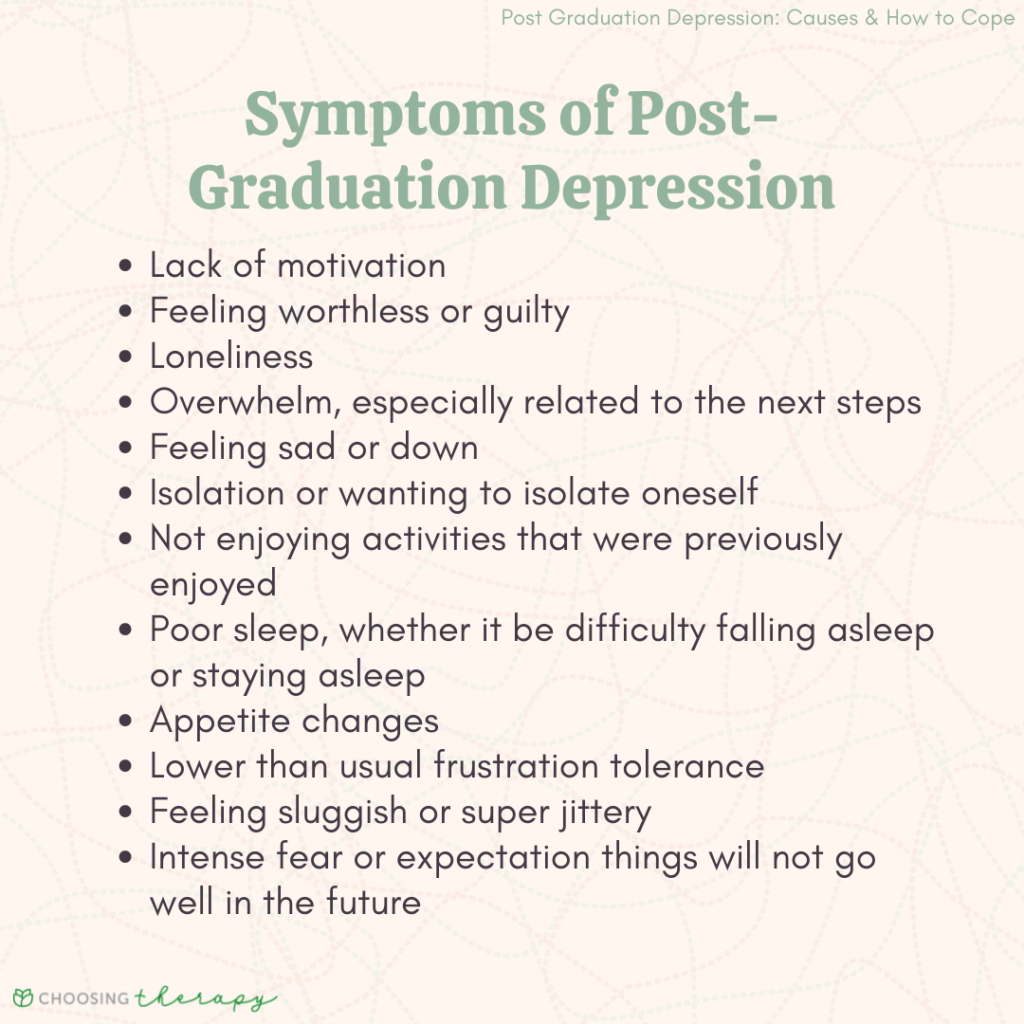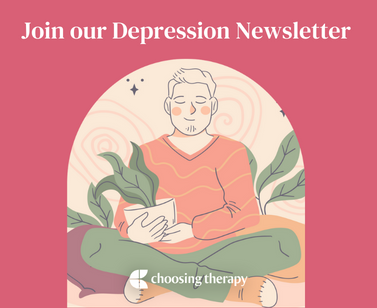After graduating college, some young people may feel depressed. Causes include having difficulty finding a job, struggling with the significant transition, or feeling like they don’t measure up to societal expectations. It is possible to prevent or heal from this depression by taking actionable steps and caring for yourself.
Depression Is Treatable With Therapy
Would you like to feel more happiness and joy? BetterHelp has over 20,000 licensed therapists who provide convenient and affordable online therapy. BetterHelp starts at $65 per week. Take a Free Online Assessment and get matched with the right therapist for you.
What Is Depression?
Depression is a general term used to describe a long-term feeling of low mood, low energy, and limited enjoyment from activities someone used to enjoy. There are many types of depression that can affect nearly all aspects of a person’s life and functioning.
What Is Post-Graduation Depression?
Post-graduation depression is a form of situational depression that emerges following a significant event—in this case finishing college. In some cases, depression in college students is already more common. Other times, the event of graduating may be so difficult that it overwhelms the individual’s ability to cope.
Signs of Post-Graduation Depression
Signs of post-grad depression include shame, self-loathing, irritation, hopelessness, lack of motivation, sleep issues, and brain fog.
Other depression symptoms related to graduating include:1
- Lack of motivation
- Feeling worthless or guilty
- Loneliness
- Overwhelm, especially related to the next steps
- Feeling sad or down
- Isolation or wanting to isolate oneself
- Not enjoying activities that were previously enjoyed
- Poor sleep, whether it be difficulty falling asleep or staying asleep
- Appetite changes
- Lower than usual frustration tolerance
- Feeling sluggish or super jittery
- Intense fear or expectation things will not go well in the future
What Causes Post-College Depression?
Graduating college is a major transition for most people. It is often the first time someone is not in school, and there are many new adult pressures. College is a unique time of growth, in that young people often have structure while in school but less so than when they were living at home with parents or caregivers.
Post-college there are a variety of pressures. Additionally, humans compare themselves with each other, and often these comparisons do little besides make us feel like we don’t measure up at this time in our lives.
Common reasons people experience post-graduation depression include:
- Pressure of finding a job: while some people may easily find a job following college, many may not. Finding a job can be discouraging, especially when jobs do not respond or you are rejected.
- Moving back in with parents: for some, it may be helpful or necessary to move back in with parents. However, this may come with some self-judgment if there was an expectation that at the end of college, you could be fully independent. Home may also not be a safe or comfortable place, which may add to the depression.
- Feeling a failure to launch: in our culture, there is an expectation that young adults are largely independent from their parents. Whether this is reasonable, some young people may stay dependent on their parents for longer, which can be called failure to launch syndrome. This may come with judgment, both from oneself and from others.
- Changes in friendships (friends scattering, not seeing them): following college, friends change in a variety of ways. You may have lived with or frequently seen friends, and now you may not be able to see them as much. Some friends may move for jobs or relationships. Dealing with loneliness as a young adult is normal, but it is not easy. This quickly changing landscape can cause or exacerbate depression.
- Student debt: upon leaving school, you may be forced to face the burden of student debt. This adds to the sudden pressures of adulthood. It may also lead to some feelings of regret and frustration toward self.
- Comparison with friends: young adults may be at a variety of different places in their life: some may be married and have children, some may just be starting to date. Some may have a great job, while others need time to figure out the next move. This wide variety of experiences, while normal, can easily lead to comparisons. These comparisons can harm self-esteem, contributing to depression.
- Overwhelm with next steps and changes: the sheer amount of tasks to complete upon leaving college may also be a factor in post-grad depression: finding an apartment, paying student loans, getting a job, choosing benefits at work, and so forth.
Help For College Students & Recent Grads
Equip – Eating Disorder Treatment That Works – Delivered At Home. Eating disorder treatment is hard – which is why you deserve a team. Equip offers evidence-based care delivered virtually by a five-person care team, so you can achieve recovery without pressing pause on your life. We take insurance! Get a Consultation
Talkiatry – Psychiatry that helps kids thrive. Safe, virtual mental health care from doctors who take insurance. Your child’s first visit is 75 minutes and includes a clinical evaluation. Visit Talkiatry
Talkspace – Feeling better starts with a single message. Start texting with a therapist. Starting at $69 per week, much less if you have insurance from Cigna, Optum, or Aetna. Meet with a licensed therapist for weekly live sessions and on-going messaging support. Get Started
How to Prevent Post-College Depression
Planning ahead and taking good care of yourself may help to prevent post-college depression. Fundamentally, just being aware of the major transition and validating the fact that it may be difficult can help to lessen the chances of it. The benefits of self-care also help to guard against depression or other mental-health concerns. By taking care of yourself in basic ways, you can increase your resilience.
Ways to prevent post graduation depression include:
- Set up informational interviews: if there is a field you want to land in, or someone who has your dream job, reach out and ask for a short informational interview. This could be in-person or via Zoom. Ask this person how they got to be where they are.
- Identify where you want to apply for jobs: start to create a list of the companies/organizations you may be interested in. When you’re ready to apply, you’ll have some of the leg work done already.
- Find job fairs: some colleges and universities host job fairs. Companies that attend are often actively hiring. This is a great way to network and apply for jobs!
- Start to understand your student-loan situation: as early as you can, learn more about your personal student-loan situation. Log into any relevant accounts, research your options for paying back the loans, and start to think about what your monthly payment will be. Considering this early will reduce the shock.
- Utilize resources that your school offers: many schools offer one-on-one assistance with creating a resume or a cover letter. Utilize these! This is an opportunity to have support developing these important tools.
- Develop a social network in the city you plan to live in: to prevent yourself from feeling isolated and lonely, try to make friends and develop a social network in the city you’ll be living in after college. This may mean getting back in touch with old friends, joining a gym, finding a meetup group, and so forth.
- Develop solid self-care skills: as you’re approaching the significant transition of finishing college, get your self-care skills on point. For example, the impact of sleep on mental health can’t be overstated. This means getting 7-9 hours of high-quality sleep, having an exercise/movement practice that you enjoy, drinking enough water, eating nutritious food, and keeping up with preventive care.
How to Cope With Post-Grad Depression: 10 Tips
Dealing with college graduation depression & anxiety can be difficult, but there are many ways to cope. Some of the ways of coping require shifting your thinking, and some require concrete, actionable steps. You can mix and match with what feels doable to you at any given time.
Here are ten ways to cope with post graduation depression:
1. Consider Therapy
If your negative feelings and depression are not shifting or are causing you to not function as well, consider exploring ways to find a therapist. A therapist can help you to understand why you are feeling a certain way and identify steps to make changes.
2. Avoid Comparing Yourself With Others
This is easier said than done, but if you can avoid comparing yourself with others, this can be very helpful. Remind yourself that everyone has their own path, and yours is unique.
3. Practice Self-Kindness & Self-Love
Try speaking to yourself like you would speak to a dear friend. We are usually the meanest to ourselves. Learning how to love yourself and give yourself compassion and grace can go a long way.
4. Reach Out to Friends
Staying connected with friends is important for managing negative feelings. Being with friends can take your mind off your troubles and give you an outlet to discuss them if you feel comfortable. Try to avoid isolating if you can.
5. Get Some Exercise/Movement
Moving your body can help shift your emotions. Find a type of movement you truly enjoy. If you hate running, for example, you don’t need to run. It may help to take your mind off things and help you feel accomplished.2
6. Don’t Be Too Hard On Yourself
In total, one of three young people move home after college.3 It is a common and necessary step that can, at times, smooth a difficult transition. Try not to be too self-critical if you wind up back at home for a while.
7. Recognize That Transitions Are Difficult
Big life transitions are stressful. Knowing this may help you cut yourself some slack and recognize that there is not anything wrong with you.
8. Find a Support Group/Networking Group
Look for a young person’s meetup group that focuses on the challenges of this transition. This will give you an opportunity for social connection and even professional networking.
9. Take Good Care of Yourself
The foundations of good mental health are quality sleep, nutritious food, exercise/movement that you enjoy, and social connection. By focusing on these fundamentals, you can improve your mental health and set yourself up to feel your best.
10. Confide In Trusted Family & Friends
If you feel ashamed and are keeping your feelings to yourself, consider talking to someone you trust. Talking through things can help you feel better. Plus, your loved ones may have some helpful outside perspectives.
How a Therapist Can Help With Depression After Graduating College
Therapy can be a helpful option when experiencing many sorts of difficulties. A therapist can help you process your difficulties, provide a neutral outside perspective, help you develop new coping skills for your unique situation, and help you get to the root of what is bothering you. If you’re wondering how to find a therapist as a young adult, explore an online directory of therapists where you can sort by specialty and insurance coverage.
Final Thoughts On Post-graduation Depression
Post-graduation is a time of intense change, meaning depression can occur. While this can feel overwhelming and discouraging, you can heal and move forward into the next phase of your life by practicing self-care and attending therapy, if necessary.
Additional Resources
To help our readers take the next step in their mental health journey, Choosing Therapy has partnered with leaders in mental health and wellness. Choosing Therapy is compensated for marketing by the companies included below.
Eating Disorder Treatment
Equip – Struggling with your relationship with food? Do you find yourself constantly thinking about food or your body? It can be exhausting to have these thoughts. The good news is: you don’t have to feel this way. Take the first step towards healing by taking Equip’s free, confidential eating disorder screener. Learn more.
Online Therapy
Talkspace – Feeling better starts with a single message. Start texting with a therapist. Starting at $69 per week, much less if you have insurance from Cigna, Optum, or Aetna. Meet with a licensed therapist for weekly live sessions and on-going messaging support. Get Started
Psychiatry, with you in mind
Talkiatry – Psychiatry that helps kids thrive. Safe, virtual mental health care from doctors who take insurance. Your child’s first visit is 75 minutes and includes a clinical evaluation. Free Assessment
OCD in Teens: Signs, Symptoms, and Treatment OCD symptoms are hard enough on fully developed adults—but what about teens who begin to exhibit signs and symptoms of obsessive-compulsive disorder (OCD) just as they’re growing into their individualism and sense of self? Unfortunately, that’s the way it is for many, as OCD most commonly develops in teen and adolescent years.
Best Online Therapy Services There are a number of factors to consider when trying to determine which online therapy platform is going to be the best fit for you. It’s important to be mindful of what each platform costs, the services they provide you with, their providers’ training and level of expertise, and several other important criteria.








